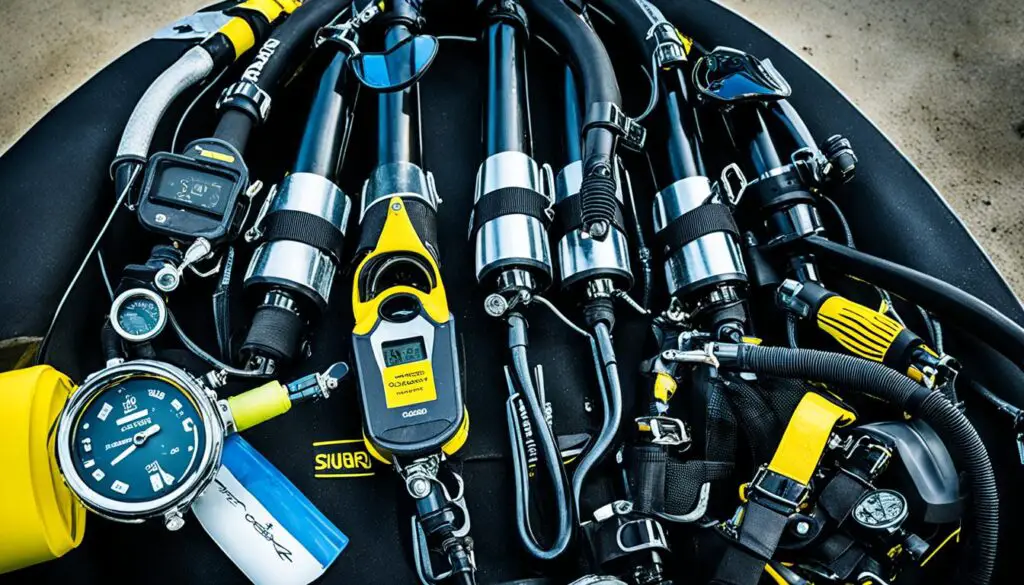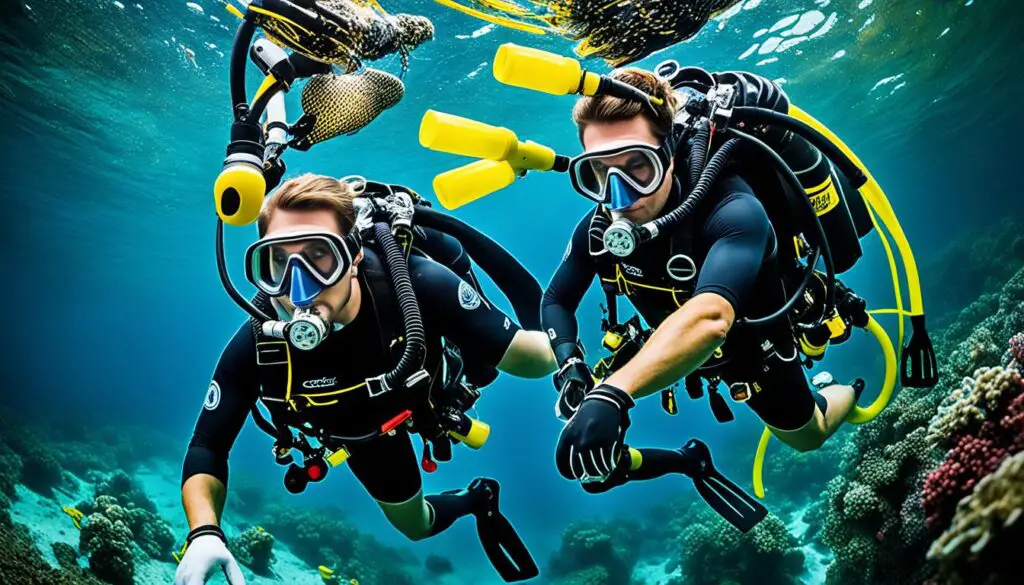Scuba diving is an exhilarating underwater adventure that allows me to explore the mesmerizing depths of the ocean. However, it is crucial to prioritize safety to ensure both a secure and enjoyable experience. By following the essential safety rules and guidelines, I can minimize risks and fully immerse myself in the wonders beneath the surface.
Key Takeaways:
- Always prioritize safety when scuba diving to ensure a secure experience.
- Follow the established safety rules and guidelines for an enjoyable adventure.
- Seek proper training and certification to acquire the necessary skills and knowledge.
- Maintain and regularly inspect scuba diving equipment to prevent malfunctions.
- Thoroughly plan and prepare for each dive, considering the conditions and establishing a buddy system.
Importance of Proper Training and Certification
When it comes to scuba diving, proper training and certification are essential. Having the necessary skills and knowledge is crucial for handling potential dangers that may arise underwater. Scuba diving training equips divers with the expertise to navigate challenging conditions and react appropriately to emergencies.
Under the guidance of experienced instructors, aspiring divers learn techniques to ensure their safety and the safety of others. They acquire knowledge in areas such as dive planning, equipment maintenance, and emergency procedures. Through comprehensive training, divers develop the competence and confidence needed to explore the underwater world responsibly.
A primary reason for obtaining scuba diving certification is to demonstrate a commitment to safety and professionalism. Certified divers have fulfilled the standard requirements set by reputable organizations, such as the Professional Association of Diving Instructors (PADI) or Scuba Schools International (SSI). Certification ensures that divers have undergone proper training and possess the necessary skills to dive safely.
“Proper training and certification are crucial for scuba divers to have the necessary skills and knowledge to handle potential dangers underwater.”
One key figure in the field of scuba diving safety is the dive safety officer (DSO). The dive safety officer plays a vital role in ensuring the well-being of divers and maintaining safety protocols. These professionals, like Sean Eckley at the Aquarium of the Pacific, have extensive knowledge and experience in dive safety. They oversee the implementation of safety measures and are equipped to handle emergencies should they occur.
Furthermore, dive safety officers understand the importance of having a hyperbaric chamber readily available. Hyperbaric chambers provide critical medical assistance in the event of decompression sickness, commonly known as “the bends.” These chambers facilitate the necessary treatment to safely manage diving-related injuries, underscoring the significance of proper training and certification in scuba diving.
Dive Safety Officer’s Role:
| Responsibilities | Key Actions |
|---|---|
| Implementing safety protocols | Establishing and enforcing guidelines for dive operations |
| Emergency response | Assessing and managing dive-related emergencies |
| Training and education | Providing instruction on safety procedures and standards |
| Equipment maintenance | Ensuring proper maintenance of diving gear |
By prioritizing scuba diving training, certification, and the expertise provided by dive safety officers, divers can enhance their safety and overall diving experience. Investing in appropriate training and certification not only ensures personal well-being but also contributes to the integrity of the diving community as a whole. So, whether you’re a beginner or an experienced diver, remember to value the importance of proper training and certification.
Equipment Safety and Maintenance
Ensuring the safety of scuba diving equipment is vital for a successful dive. Regular gear maintenance, such as checking for leaks and malfunctions, is essential to prevent any mishaps underwater. Additionally, following equipment safety protocols, like proper tank handling and mask clearing techniques, can significantly reduce the risk of accidents.
Equipment Safety Rules
- Always inspect your diving equipment before each dive.
- Check for any signs of wear and tear, such as frayed straps or cracks in the mask lenses.
- Ensure that your diving gear is properly fitted and adjusted to your body.
- Secure all loose items, such as dive lights or regulators, to avoid entanglement.
- Never exceed the weight limit of your BCD (buoyancy control device) to maintain proper buoyancy control.
Gear Maintenance Tips
Here are some essential maintenance tips to keep your scuba diving equipment in top condition:
| Equipment | Frequency | Maintenance Task |
|---|---|---|
| Mask and snorkel | After each dive | Rinse with fresh water and thoroughly remove any sand or debris. Check for any cracks or damage. |
| Regulator | Annually or as recommended by the manufacturer | Have your regulator serviced by a certified technician to ensure optimal performance and safety. |
| Wetsuit or drysuit | After each dive | Rinse with fresh water and hang to dry away from direct sunlight. Check for any tears or punctures. |
| BCD | Annually or as recommended by the manufacturer | Inspect for any leaks or malfunctions. Test the inflator and dump valves for proper operation. |
| Fins | After each dive | Rinse with fresh water and remove any sand or debris. Check for any loose or broken straps. |
By adhering to these equipment safety rules and maintenance tips, you can ensure the longevity and dependability of your scuba diving gear, providing you with peace of mind during your underwater adventures.

Planning and Preparation for Dives
Adequate planning and preparation are crucial for ensuring the safety of scuba diving. Before each dive, it is essential to assess the conditions, including currents and visibility, to plan accordingly and minimize risks. Dive planning enables divers to anticipate potential challenges and take appropriate safety measures.
One important aspect of dive preparation is checking and double-checking equipment. This includes inspecting the oxygen tanks, regulators, masks, fins, and other gear to ensure they are in proper working condition. Divers should also ensure that they have the necessary tools and spare parts for any minor repairs that may be required during the dive.
Establishing a reliable dive buddy system is another vital safety measure. Having a trusted partner with whom you can communicate and rely on during the dive significantly enhances safety. The dive buddy system helps monitor each other’s well-being, provides assistance in case of emergencies, and enhances overall situational awareness.
Communication and Safety Measures
Effective communication is crucial for dive safety. Before starting the dive, it’s important to communicate your dive plans with the dive buddy, as well as with the boat or dive operator personnel. This ensures that everyone is aware of your intended dive duration, approximate depth, and emergency procedures in case you encounter any difficulties.

During the dive, it is essential to maintain clear communication signals and adhere to commonly recognized hand signals to alert your buddy or dive team in case of any issues. Regularly checking in with your buddy is crucial to ensure both safety and enjoyment throughout the dive.
The key to a successful dive lies in thorough planning, meticulous preparation, and effective communication. By prioritizing safety measures, divers can enjoy a safe and memorable underwater experience.
In summary, dive planning and preparation are vital for dive safety. Evaluating conditions, checking equipment, establishing a dive buddy system, and maintaining clear communication with dive partners and operators are essential elements in ensuring a safe and enjoyable dive. By following these dive safety measures, divers can mitigate risks and make the most of their underwater adventures.
Conclusion
Prioritizing safety is essential for every scuba diver. By adhering to established scuba diving safety guidelines, obtaining proper training and certification, maintaining equipment, and planning and preparing for dives, divers can minimize risks and ensure a safe and enjoyable underwater adventure.
Scuba diving safety guidelines provide divers with a framework to assess and mitigate potential risks. These guidelines emphasize the importance of being well-prepared and equipped to handle different situations that may arise underwater.
Divers should always prioritize their well-being by following these safety guidelines. By obtaining proper training and certification, divers can develop the necessary skills to handle potential dangers and emergencies that may occur during a dive.
Maintaining scuba diving equipment is crucial in ensuring a safe dive. By regularly inspecting and maintaining gear, divers can minimize the risk of malfunctions or equipment failure while underwater. Additionally, proper planning and preparation, such as assessing dive conditions and communicating dive plans with others, further contribute to a safer diving experience.
Remember, when it comes to scuba diving, safety should always come first. By prioritizing well-being and following the necessary precautions, divers can fully enjoy the excitement and beauty of their underwater adventures.
FAQ
What are some important scuba diving safety rules?
Some important scuba diving safety rules include always diving with a buddy, maintaining proper buoyancy control, ascending slowly to avoid decompression sickness, and not exceeding your certification limits. It’s also essential to monitor your air supply, carry a dive knife for emergencies, and conduct a safety stop at the end of each dive.
Why is proper training and certification important for scuba divers?
Proper training and certification are crucial for scuba divers to acquire the necessary skills and knowledge to ensure their safety underwater. Training programs provide divers with essential information on equipment use, emergency procedures, and dive planning. Certification ensures that divers have met the standards set by reputable diving organizations, confirming their competence and readiness for the challenges of scuba diving.
What is the role of a dive safety officer?
A dive safety officer, like Sean Eckley at the Aquarium of the Pacific, plays a vital role in ensuring the safety of divers. They oversee diving operations, enforce safety regulations, conduct training programs, and maintain the readiness of the hyperbaric chamber for emergencies. Dive safety officers are responsible for assessing diving conditions, promoting safe diving practices, and responding promptly to any incidents or accidents that may occur.
How can I ensure the safety and maintenance of my scuba diving equipment?
To ensure the safety and maintenance of your scuba diving equipment, it is important to perform regular checks for leaks and malfunctions. Inspect your gear before each dive and ensure all components are in proper working condition. Follow equipment safety protocols, such as proper tank handling and mask clearing techniques. Store your equipment in a dry and secure place to prevent damage, and rinse it with fresh water after every dive to remove salt residue.
What are some important dive planning and preparation techniques?
Before each dive, it is essential to assess the diving conditions, including factors like currents and visibility. Plan your dive accordingly, taking into account the depth, dive time, and any potential hazards. Always check and double-check your diving equipment, ensuring everything is functioning correctly and all necessary safety equipment is in place. Establish a dive buddy system to enhance safety, and communicate your dive plans with others, including expected entry and exit times.
Why is it important to prioritize safety in scuba diving?
Prioritizing safety in scuba diving is crucial to minimize the risks involved and ensure an enjoyable underwater adventure. Adhering to established safety guidelines, obtaining proper training and certification, maintaining equipment, and planning and preparing for dives are all essential steps to protect your well-being. By prioritizing safety, divers can dive with confidence, knowing they have taken the necessary precautions to mitigate potential dangers and fully enjoy their scuba diving experiences.
